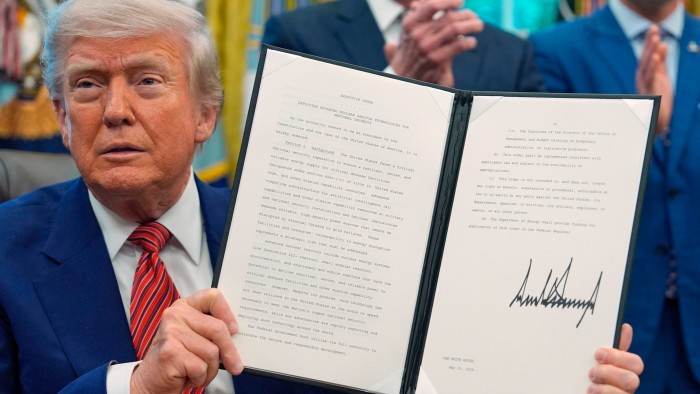Unlock the White House Watch newsletter for free
Your guide to what Trump’s second term means for Washington, business and the world
Donald Trump has directed the government to fast-track construction of nuclear reactors and reform the “risk averse” culture of regulation in a bid to quadruple the US’s atomic energy capacity by 2050.
The president on Friday signed four executive orders that instructed the Department of Energy to facilitate the start of construction for 10 large reactors by 2030 and help finance power upgrades to existing reactors.
In a factsheet accompanying the executive order, the White House said the Nuclear Regulatory Commission had an “overly risk-averse culture”, which requires nuclear facilities to emit as few emissions as possible, including below naturally-occurring levels.
Other measures in the orders include an 18-month deadline for the NRC to approve new reactors and to boost US uranium and nuclear fuel capacity. The orders also called on the energy and defence departments to facilitate development of reactors on federal lands.
“The NRC has failed to license new reactors even as technological advances promise to make nuclear power safer, cheaper, more adaptable and more abundant than ever,” the factsheet said.
White House science and technology policy director Michael Kratsios said that the executive orders would kick-start an “American nuclear renaissance”.
“America’s great innovators and entrepreneurs have run into brick walls when it comes to nuclear technology,” he said.
Nuclear proponents welcomed the administration’s support for a sector which has been plagued in recent decades by long delays to build plants as well as cost overruns. They say nuclear is needed to meet booming artificial intelligence-fuelled energy demand and to lower the US’s carbon dioxide emissions.
“This is an incredible day for nuclear,” said Isaiah Taylor, chief executive of Valar Atomics. He said it was set to open a nuclear reactor in Utah by the end of the year. “The new posture is one of dominance.”
Jacob DeWitte, chief executive of nuclear power start-up Oklo, said that the executive orders provided an opportunity to “bring regulatory regimes back to what their intents were”.
“We need to couple this with permitting reform,” he added.
The proposal to radically reform the NRC will cause concerns among nuclear safety advocates, while other industry experts questioned whether the orders are far-reaching enough. The sector is notoriously cost and capital intensive and also faces tariffs and uncertain government support.
“How can you plan a multibillion-dollar project and finance it when you don’t know [how long Inflation Reduction Act] tax subsidies, tariffs, or what Trump is signing today will be around?” said an industry insider.
“Had it gone through 60 votes in the Senate, as a business person, I’d have put more faith in that,” they added.
Nuclear industry critics warned the Trump administration’s actions risked undermining public trust in the sector by weakening the oversight role of the Nuclear Regulatory Commission.
“By fatally compromising the independence and integrity of the NRC, and by encouraging pathways for nuclear deployment that bypass the regulator entirely, the Trump administration is virtually guaranteeing that this country will see a serious accident or other radiological release,” said Edwin Lyman, a nuclear expert at the Union of Concerned Scientists, an environmental advocacy group.
“Such a disaster will destroy public trust in nuclear power and cause other nations to reject US nuclear technology for decades to come.”
Some industry experts said the administration’s plan to facilitate construction of 10 large nuclear reactors was ambitious given that only two large-scale reactors have been completed in the US over the past two decades. Both reactors at the Vogtle plant in Georgia cost more than $30bn to complete, double their initial estimates.
Shares in Oklo, the small modular reactor developer backed by OpenAI chief executive Sam Altman, jumped 24 per cent. NuScale, which also designs SMRs, gained 15 per cent.
Nuclear fuel company Centrus Energy’s share price rose by 20 per cent, while, Cameco, the world’s largest publicly traded uranium company increased 10 per cent.
Gains in utility-scale nuclear companies such as Constellation and Dominion were more muted, with share price rises of 3 per cent and 1 per cent respectively.
